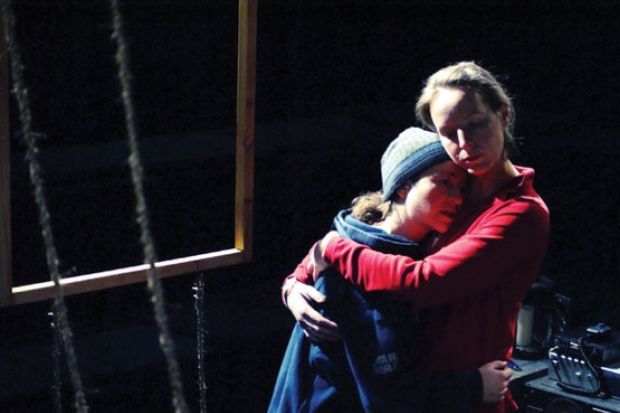Panic Patterns
By Louise Welsh and Zoë Strachan
Directed by Alison Peebles
Starring Selina Boyack and Veronica Leer
Citizens Theatre, Glasgow
Runs 19-30 October before being adapted for BBC Scotland Radio Drama as one of its 2011 commissions
Glasgay!, Scotland's annual carnival of queer culture, has been painting the grey and gritty city of Glasgow flamingo pink since 1993 with a four-week festival of drama, dance, music, art and clubs. One of its two major commissioned works this year is Panic Patterns, by Louise Welsh and Zoë Strachan. The authors, familiar figures on the Scottish scene, are better known as noirish novelists than playwrights - Welsh's The Cutting Room (2002) and Strachan's Spin Cycle (2004) marked them out as pioneers of Glasgow Gothic - but Scotland has a strong tradition of writers flitting between forms. Alasdair Gray, James Kelman and Denise Mina have all filled theatres as well as bookshops. Panic Patterns extends and intensifies Welsh and Strachan's engagement with the edginess of the Scottish psyche and more broadly with the ways in which death and desire threaten to undo established intimacies.
At just under an hour, this brooding two-hander has the feel of a more peopled and protracted piece, an impression created by a beautifully measured script that starts in a small and isolated way with a voice speaking into the silence of a dead radio and ends at a high pitch in the remorse code of a break-up against the backdrop of something global. Birds of a feather Jacq (Selina Boyack), a professor of ornithology, and Fay (Veronica Leer), her Ivy League-bound postdoctoral research assistant, are lovers marooned on a remote Scottish island. More chippy than chirpy, they're far from happy campers. Their ship's not come in, their food's running out, and that's before we get to the bottomless rucksack of personal stuff.
Jacq still carries baggage from an affair with another student; Fay's on the verge of a fellowship in the States that's tainted by what happened while she was away on a previous visit. Their relationship is on the rocks, and as if communication wasn't difficult enough, the birds are behaving strangely, non-native species appearing out of nowhere to ruffle the feathers of local breeds. Does the birds' refusal to roost signify a disaster that's rendered their beaked promontory literally the last place on Earth? Or has their cuckoo's nest caused the women to imagine an apocalypse of their own? Are they birdwatching or witnessing the end of times?
No man is an island, but these two women appear to be one. Insulated from the outside world, in a panic room of their own, they pass from anxiety at their predicament to painful probing - visceral and violent - into a past more shared than Fay would like. She's cuckquean of all she surveys. For Jacq, the spectre of inappropriate conduct overlaid by homophobia waits at what's left of home, while ahead is the wide Atlantic that will separate the lovers should Fay, spitting feathers but not yet ready to fly, ever make it to her fellowship. Superb performances from Boyack and Leer, playing the stranded lovers with fire and ice, make the audience forget that their seats have no backs, only edges, like the dialogue. Outside the actors' cramped quarters, in-the-round in the crucible of the Citizens Theatre's upstairs studio space, we see through both ends of the telescope: apocalypse now in the recriminations and revelations of the relationship-wrecked lovers; Armageddon beyond in the shrieking gulls and crashing waves.
There's a hint of Hitchcock when an unexpected guest crashes the hen party, a dove that doesn't come in peace, and a rare specimen in those parts, but under the deft direction of Alison Peebles the play's apoca-lyptic undertow never breaks the surface, passing instead like the shadow of a whale beneath a boat. Colin O'Hara's stark set design makes excellent use of a claustrophobic setting, while Nichola Scrutton's ghost-radio music and Grant Anderson's emergency lighting - the actors shrug off their backpacks and shoulder their grudges in the glow and glare of candles and torches - add to a twitchy atmosphere. As the two lost lovebirds look to the lighthouse for a way out, there's a sense that the disaster between them is greater than the one beckoning beyond, and gayness has nothing - and everything - to do with it.
Co-authorship is a relationship too, a hybrid form that, like an aircraft carrier, depends on one platform for another to take off. The play's the thing, of course, but one wonders if the star-crossed writers behind Panic Patterns gave it wings, because it has both backlift and exit velocity.
Register to continue
Why register?
- Registration is free and only takes a moment
- Once registered, you can read 3 articles a month
- Sign up for our newsletter
Subscribe
Or subscribe for unlimited access to:
- Unlimited access to news, views, insights & reviews
- Digital editions
- Digital access to THE’s university and college rankings analysis
Already registered or a current subscriber? Login
